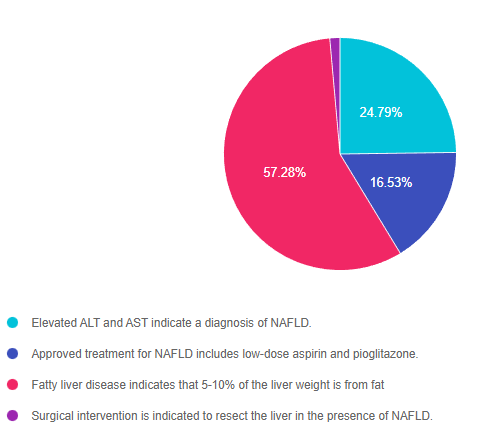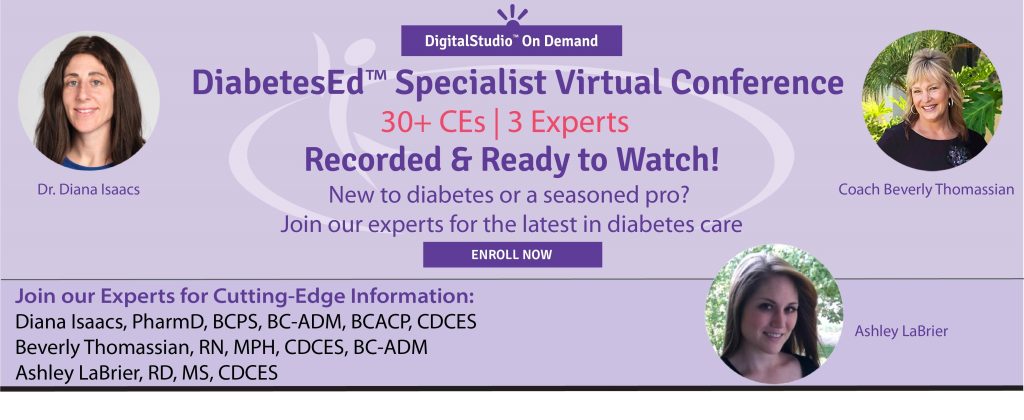
For last week’s practice question, we quizzed test takers on fatty liver disease. 57% of respondents chose the best answer. We want to share this important information, so you can pass it on to people living with diabetes and your colleagues, plus prepare for exam success!
Before we start though, if you don’t want any spoilers and haven’t tried the question yet, you can answer it below: Answer Question
Question: 45 to 75% of individuals with type 2 diabetes have non-alcoholic fatty liver disease (NAFLD). NAFLD has associated with an increased risk of steatohepatitis, cirrhosis, and liver cancer. Which of the following statements is true based on ADA Standards of Care?
Answer Choices:
- Elevated ALT and AST indicate a diagnosis of NAFLD.
- Approved treatment for NAFLD includes low-dose aspirin and pioglitazone.
- Fatty liver disease indicates that 5-10% of the liver weight is from fat.
- Surgical intervention is indicated to resect the liver in the presence of NAFLD.

As shown above, the most common choice was option 3, the second most common answer was option 1, then option 2, and finally 4.
Getting to the Best Answer
Answer 1 is incorrect. 24.79% chose this answer, “Elevated ALT and AST indicate a diagnosis of NAFLD.” These two liver enzyme tests certainly indicate liver inflammation and are a signal that further investigation is warranted. However, to confirm and diagnose NAFLD, a comprehensive review of patient history, lab results, liver imaging studies and possibly a biopsy are required.
Answer 2 is incorrect. 16.53% of you chose this answer, “Approved treatment for NAFLD includes low-dose aspirin and pioglitazone.” The cornerstones of treatment for NAFLD are nutrition therapy interventions with a focus on decreasing processed foods, sugary beverages and foods high in saturated fat. Plus, increasing intake of whole foods and committing to a structured physical activity plan to decrease visceral and hepatic adiposity is imperative. There is no officially approved medication to treat NAFLD, but pioglitazone and GLP-1 RA’s appear to decrease fatty liver based on current studies.
Answer 3 is correct. 57.28% of respondents chose this answer, “Fatty liver disease indicates that 5-10% of the liver weight is from fat.” GREAT JOB, this is the best answer. The good news is that weight loss and increased activity are very effective in treating fatty liver disease. A weight loss of 7-10% linked with a 50% drop in liver fat. Every pound lost makes a big difference. The cornerstones of treatment for NAFLD are nutrition therapy interventions with a focus on decreasing processed foods, sugary beverages and foods high in saturated fat. Plus, increasing intake of whole foods and committing to a structured physical activity plan to decrease visceral and hepatic adiposity is imperative.
Finally, Answer 4 is incorrect. 1.41% chose this answer, “Surgical intervention is indicated to resect the liver in the presence of NAFLD.” People with NAFLD and other risk factors, have an increased risk of disease progression to cirrhosis and liver cancer, which might require surgical intervention. However, no surgical intervention is warranted for NAFLD. The cornerstones of treatment for NAFLD are nutrition therapy interventions with a focus on decreasing processed foods, sugary beverages and foods high in saturated fat. Plus, increasing intake of whole foods and committing to a structured physical activity plan to decrease visceral and hepatic adiposity is imperative.
Want to learn more about this question? Join us for our upcoming webinar
Test Taking Practice Exam Toolkit | FREE Webinar
Are You Ready for Exam Success?
Join us live Thursday, June 30th at 11:30 am PST
Learn Test-Taking Secrets with Coach Bev – Option to add on 200+ Computerized Practice Test Questions for $49
During this webinar, Coach Beverly will help you transform your nervousness into focused energy that will help you succeed. She will provide test-taking tips based on her experience taking the certification exam six times.
To provide plenty of practice, Coach Beverly will sample 20 test questions that have been plucked from our Test Taking Toolkit during this live webinar.
She will explain how to dissect the question, eliminate wrong answers and avoid getting lured in by juicy answers.
Two Ways to Join
Includes a review of 20 sample test questions with test taking strategies.
This includes access to the recorded version of this webinar on your Online University Student Portal.
Plus, the Test Taking Toolkit provides you with over 200+ sample online practice questions, simulating the exam experience.
A perfect way to assess your knowledge and create a focused study plan, while increasing your test-taking confidence.
Want to learn more about Diabetes Care? View our
Virtual DiabetesEd Specialist Conference
30+ CEs
Recorded & Ready to Watch!

Whether you are new to diabetes or a seasoned expert, you’ll benefit from this virtual conference with the latest research plus critical content that you can immediately apply to your clinical practice.
Download Course Flyer
If you are seeking a state-of-the-art review of current diabetes care, this course is for you. Our team has been fine-tuning this course for over fifteen years, and we know what you need. This program can also be a great addition to your CDCES or BC-ADM exam study plan.
Join us LIVE for this Virtual Course and enjoy a sense of community!
Team of expert faculty includes:
- Diana Isaacs, PharmD, BCPS, BC-ADM, BCACP, CDCES – Educator of the Year, 2020
- Coach Beverly Thomassian, RN, MPH, CDCES, BC-ADM
- Ashley LaBrier, MS, RD, CDCES, Diabetes Program Coordinator
Virtual DiabetesEd Specialist Conference Deluxe | 30+ CEs
Deluxe Option for $449: Virtual Program includes:
- Q & A Session with the instructor after each webinar.
- LIVE Presentations by our team of experts.
- State of the art review of current diabetes care and technology.
- Resources for each session.
- Access to free podcasts and video recordings within a week of each live session for one year.
Deluxe Version includes Syllabus, Standards and Swag*:
- Diabetes Educator Course 2022 Syllabus Hard Copy – over 100 pages -This spiral-bound workbook contains the printed version of all of the instructor’s slides.
- ADA 2022 Standards of Care Book -The ADA Standards of Medical Care in Diabetes is a key resource for healthcare professionals involved in diabetes care, education, and support.
- DiabetesEd Services highlighters, Medication PocketCard, Tote Bag and Pen
Don’t worry if you can’t make it live. Your registration guarantees access to the recorded version in the Online University.
All hours earned count toward your CDCES Accreditation Information
Sign up for Diabetes Blog Bytes – we post one daily Blog Byte from Monday to Friday. And of course, Tuesday is our Question of the Week. It’s Informative and FREE! Sign up below!
The use of DES products does not guarantee the successful passage of the CDCES exam. CBDCE does not endorse any preparatory or review materials for the CDCES exam, except for those published by CBDCE.









